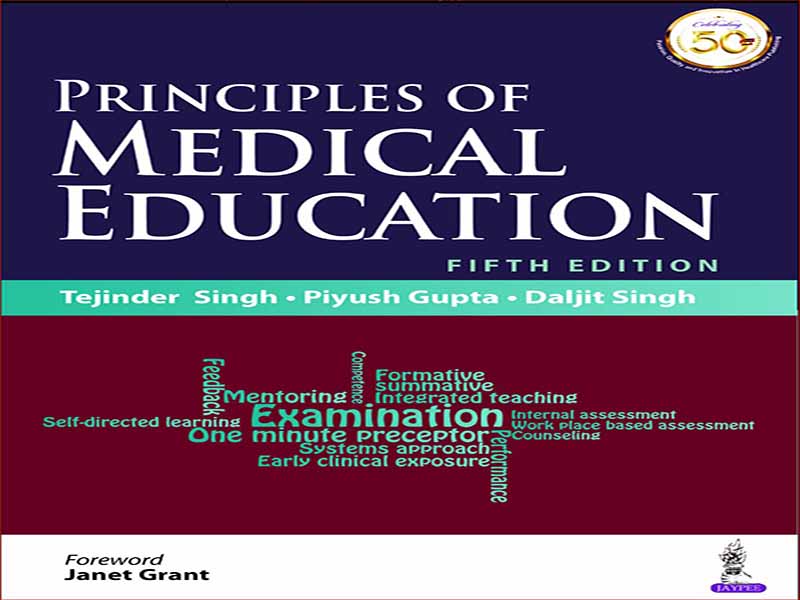- عنوان کتاب: Principles of MEDICAL EDUCATION
- نویسنده: Tejinder Singh
- حوزه: فارماکولوژی
- سال انتشار: 2023
- تعداد صفحه: 260
- زبان اصلی: انگلیسی
- نوع فایل: pdf
- حجم فایل: 9.85 مگابایت
ویرایش جدید این کتاب راهنمای اصول آموزش پزشکی به موقع است. آموزش پزشکی در هند در هجوم تغییرات اساسی است. از وعده مقررات جدید تا تعریف برنامه درسی جدید با ساختار جدید، ایده های جدید در مورد نحوه ورود دانشجویان به دانشکده پزشکی، ایده های جدید در مورد نحوه یادگیری آنها، حوزه های جدید محتوا و روش های جدید پیشرفت مبتنی بر ارزیابی. مانند هر نوآوری آموزشی گسترده دیگری، بدون بحث نیست. قصد اساسی آشکار برای پرداختن به تنوع در کیفیت آموزش پزشکی قابل ستایش به نظر می رسد. شاید این احساس نیز وجود داشت که آزمایش ایده هایی که در جاهای دیگر مورد استفاده قرار گرفته اند ممکن است آموزش پزشکی را در هند بهبود بخشد. در حالی که تعدادی دستورالعمل برای تمرین و برنامه ریزی ارائه شده است، مهم است که توسعه یک برنامه درسی زمینه ای و همچنین شایستگی های جدید معلولیت در پایه را در نظر بگیریم. اینها ممکن است در نسخه بعدی این کتابچه راهنمای کاربر ظاهر شوند. ممکن است همراهی با چنین منظره ای که به سرعت در حال حرکت است دشوار باشد. و از هر معلم و رهبر آموزشی انتظار می رود که رویه و برنامه ریزی خود را به گونه ای تغییر دهد تا خواسته های جدید را برآورده کند. این کتاب کمک خواهد کرد. این کتاب راهنما است که به طرز ماهرانه ای نکات برجسته بسیاری از مفاهیم جاری را خلاصه می کند. باید به نویسندگانی تبریک بگویم که توانسته اند به طرز شگفت انگیزی ماهیت هر موضوع را در چند کلمه بیان کنند. این باعث می شود این منبع بسیار در دسترس باشد. اگرچه تکنیکهای تفصیلی در فصلها توسط استنادهای درون متنی پشتیبانی نمیشوند، میتوانم بفهمم که چرا این کتاب راهنما این سبک غیر آکادمیک را انتخاب کرده است. آموزش پزشکی در نتیجه یک پایگاه شواهد جدید و قانع کننده تغییر نمی کند. آموزش پزشکی یک علم اجتماعی است و به این ترتیب، به جای شواهد، تمایل به تغییر بر اساس روندهای اجتماعی دارد. در آموزش، برخی از ایده ها صرفاً به عنوان یک الزام سیاسی یا نظارتی در عمل ادغام می شوند. تغییرات آموزشی اغلب بر اساس ارزش ها و استدلال های جاری است تا شواهد. بنابراین، با کنار گذاشتن خطر سرقت ادبی، امیدوارم که این رویکرد خواننده را در انتقاد، پرسش و مطالعه پیرامون هر موضوع آزاد کند. و سپس به نتیجه گیری خود در مورد سودمندی زمینه ای ایده هایی که به وضوح ارائه شده اند برسید. جوهر علم اجتماعی نقد است. از طرف دیگر، من می دانم که وقتی نیاز به تغییر وجود دارد، یک خلاصه صریح می تواند راهنمایی اطمینان بخش باشد. و به عنوان مقدمه ای بر وسعت آموزش پزشکی، این کتابچه راهنمای بسیاری از زمین را نیز مشخص می کند و اصطلاحات و مفاهیم اساسی را به خوبی توضیح می دهد. این ارائه صادقانه برخی از ایده های غالب در آموزش پزشکی است. با آمدن از بخشی از جهان که بیشتر این ایده ها از آنجا سرچشمه گرفته اند، می دانم که آنچه گفته می شود و آنچه انجام می شود اغلب بسیار متفاوت است. به عنوان یک روانشناس آموزشی، مشکل شخصی من یادگیری بزرگسالان است: اینکه همچنان به عنوان یک نظریه تبلیغ می شود برای من یک راز است. این ایده ای است که هیچ پایه شواهدی ندارد و از بستر آموزش حرفه ای ناشی نشده است. و اینجاست که نقد و تأمل شما وارد می شود. با نگاه به آینده، من معتقدم که چنین نقد و تأملی به کتابی منتهی می شود که شامل نظریه ها و تکنیک هایی است که در هند متولد شده اند، در کنار آنهایی که در جاهای دیگر اختراع شده اند. غنای فلسفه آموزشی، ارزشها و عمل در هند، مطمئناً باید باعث ایجاد ایدههای جدیدی شود که ما از سایر بخشها باید در نظر بگیریم. من از دیدن تمرکز بر ارزیابی در این کتاب خوشحالم. اگرچه روندها در این زمینه نیز تغییر میکنند، و به نظر میرسد روندهای فعلی به سمت رویکردهای کلنگرتر است، رویههای روشن و احتمالاً تا حد زیادی بیمناقشهای برای توسعه آزمونها وجود دارد که باید دنبال شوند. با این وجود، حتی ایدههایی مانند ارزیابی مبتنی بر محل کار به جای اعمال قواعد معیارهای معتبر و قابل اعتماد، توسط ایدههای بازخورد هدایت میشوند. و در آن، مانند تمام آموزش ها، اصل امکان سنجی اساسی است. نمیدانم با توجه به زمانهای پرتلاطم و هیجانانگیز آموزش پزشکی در هند، فصلی درباره مدیریت ممکن است مفید نبوده باشد: مدیریت برنامه درسی، مدیریت منابع، مدیریت تغییر. من همیشه بر این باور بودهام که بیشتر موفقیت آموزش و پرورش در عمل به مدیریت آن است تا شعارهای آن. بنابراین در خواندن این منبع فوق العاده، به فکر کردن و پرسیدن سوال ادامه دهید. من به نویسندگان به دلیل توانایی آنها در ارائه ایده های پیچیده به طور خلاصه و اقتصادی تبریک می گویم. این نه یک دستورالعمل است و نه یک رساله دانشگاهی. این مقدمه ای مختصر برای چشم انداز فعلی آموزش پزشکی است. خواهید دید که سوال میپرسید: و این چیزی است که باید در این حوزه از علوم اجتماعی اتفاق بیفتد.
The new edition of this handbook, Principles of Medical Education, is timely. Medical education in India is in the throes of fundamental change; from the promise of new regulation to the definition of a new curriculum with a new structure, new ideas about how students should enter medical school, new ideas about how they should learn, new areas of content and new assessment-based methods of progression. As with any such sweeping educational innovation, it is not without its controversies. The apparent underlying intention to address the variability in quality of medical education seems laudable. Perhaps there was also a feeling that trying ideas that have been used elsewhere might improve medical education in India. While a number of guidelines for practice and planning have been provided, it is important to consider the development of a contextual curriculum as well as the new disability competences in foundation. These might appear in the next edition of this handbook. It might be difficult to keep up with such a fast-moving landscape. And every teacher and educational leader will be expected to change their practice and planning in one way or another to meet the new demands. This book will help. It is a handbook that skilfully summarizes the salient points of many current concepts. I must congratulate the authors who have managed to be wonderfully clear in presenting the essence of each topic in a very few words. That makes this resource highly accessible. Although the techniques detailed in the chapters are not supported by in-text citations, I can understand why this handbook has chosen this non-academic style. Medical education does not change as a result of a new and convincing evidence base. Medical education is a social science, and as such, it tends to change on the basis of social trends rather than evidence. In education, some ideas are integrated into practice simply as a political or regulatory imperative. Educational change is often based on current values and argument rather than evidence. So, putting the risk of plagiarism aside, I hope that this approach liberates the reader to be critical, to question and to read around each topic. And then to reach your own conclusions about the contextual usefulness of the ideas so clearly presented. The essence of social science is critique. On the other hand, I know that when there is the need to change, then a pithy summary can offer reassuring guidance. And as an introduction to the breadth of medical education, this handbook also sets out a lot of the terrain and explains terminology and basic concepts very well. It is a faithful presentation of some dominant ideas in medical education. Coming from the part of the world where most of these ideas originated, I know that what is said and what is done are often very different. As an educational psychologist, my personal bugbear is adult learning: that it continues to be touted as a theory is a mystery to me. It is an idea that has no evidence base, and did not arise from the context of professional training. And that is where your own critique and reflection come in. Looking towards the future, I believe that such critique and reflection will lead to a book that includes theories and techniques that have been born in India, alongside those that were invented elsewhere. The richness of educational philosophy, values and practice in India should surely have given rise to new ideas that those of us from other parts should consider. I am pleased to see the focus on assessment in this book. Although trends change in this field too, and the current trends seem to be towards more holistic approaches, there are clear, and possibly largely uncontentious, procedures for the development of examinations that must be followed. Nonetheless, even ideas such as workplace-based assessment have been driven by ideas of feedback, rather than by applying the rules of valid and reliable measures. And in that, as in all education, the principle of feasibility is fundamental. I wonder whether, given the turbulent and exciting times in medical education in India, a chapter on management might not have been useful: managing the curriculum, managing resources, managing change. I have always believed that much of the success of education in practice is in its management rather than its rhetoric. So in reading this wonderful resource, keep thinking and asking questions. I congratulate the authors for their ability to present complex ideas so succinctly and economically. This is neither an instruction manual, nor is it an academic treatise; it is a concise introduction to the current landscape of medical education. You will find yourself asking questions: and that is what should happen in this area of social science.
این کتاب را میتوانید از لینک زیر بصورت رایگان دانلود کنید:
Download: Principles of MEDICAL EDUCATION



































نظرات کاربران